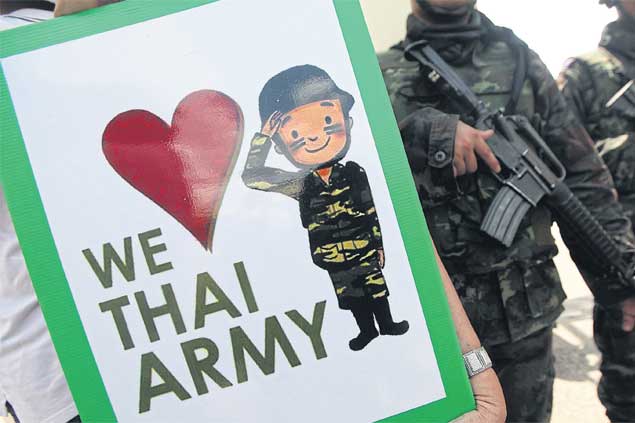
After two years of hope and anticipation, it is clear now that Thailand is no closer to peace and reconciliation than it was in the run-up to its latest military coup. In addition to the colour-coded divisions among civilians that have beset Thai politics over the past decade, we now suffer from a recurrent chasm between military authorities and civilian forces that was last seen more than two decades ago. As junta rule extends into a third year and possibly beyond, it looks increasingly like a combustible recipe full of tensions and risks that can only be cleared with a return to a legitimate government under popular rule.
While domestic dissent builds and international scrutiny intensifies, much of what has not gone right for the regime is attributable to the initial period of their putsch. When Gen Prayut Chan-o-cha and the National Council for Peace and Order (NCPO) seized power in May 2014, they brought respite to many as law and order returned to Bangkok after six months of demonstrations against former prime minister Yingluck Shinawatra and her Pheu Thai Party-led government, which in turn was answerable to her ousted and exiled brother, Thaksin.
At that time, many of us wanted to believe in the change and ended up pretending that it was a good coup, even though recent experiences suggest there can be no such thing in Thailand. Two years on, the military's pursuit of its own corporate interests and its will to hunker down for the long haul are unmistakeable. The NCPO's lack of an exit strategy and its determination to oversee a five-year hold on power against the backdrop of a two-decade "redevelopment" of Thailand, in view of the royal transition, is likely to raise the stakes and political risks inexorably.
Despite a constitution-drafting process that will be decided via a referendum on Aug 7 ahead of promised elections next year, the ruling generals will rely on charter provisions that stack military prerogatives in an appointed Senate and military-influenced agencies to keep the post-election government in check. As the draft constitution has done away with the requirement that the prime minister be an MP, the window is open for the top brass to take the helm of government, directly or through a proxy. Even if the referendum is rejected, the Prayut government and the NCPO can contrive a similar charter from previous versions to hold elections next year as pledged. Delaying the election timetable indefinitely would be a major loss of face for the military government, and it would render Thailand an outright military dictatorship.
Confident of their fraternal unity and control of the high command and officer corps, the junta can only stay around through the referendum and the next polls by becoming ever more repressive against local dissent and growing opposition to its rule. The likelihood of more tension and outright clashes between Thailand's military government and civil society will thus mount as referendum day approaches. Having overthrown two military dictatorships since the early 1970s, Thai civil society is unlikely to put up with the NCPO indefinitely.
When the NCPO seized power, the generals made the mistake of not sharing power with technocrats after other recent coups in 1991-92 and 2006-07. A civilian-led cabinet of policy professionals in 1991-92 provided a buffer, know-how and exit strategy for the generals. In 2006-07, the coup-makers enticed privy councillor and retired army chief, Gen Surayud Chulanont, to lead the government and absorb the pressure and demands that came with it. Then prime minister Surayud kept the election timing for December 2007 on track through personal fortitude against temptations to maintain power, enabling the coup to expire.
One of the luckiest people in Thai politics is Gen Sonthi Boonyaratglin, the lead coup-maker at that time. The December 2007 elections gave him an out. He returned to normal life, even with a political career as a politician who contested the 2011 poll. Gen Sonthi and his junta colleagues had wanted to delay the poll, but Gen Surayud did him the favour of sticking to the election date.
The NCPO does not really have an expiry date. This junta, with generals trained to rule the barracks now supervising a complex economy and government, may well turn out to be its own worst enemy by prolonging its rule.
Some who initially supported the 2014 putsch are now saying that current conditions, where Thailand is internationally isolated amid economic doldrums and lingering political malaise, are not what they signed up for. Thai civil society has been compromised and divided along the Thaksin fault line in recent years but the prospect of longer-term military rule and the controversial draft charter are forcing it to regroup and regain lost ground.
Thailand is unlikely to reach political clarity and a new normal of sorts until the royal transition comes to pass. The jockeying and manoeuvring will continue until then. The junta has squandered a profound chance to be a broker of a new Thailand that can reconcile the traditional elites from the old order anchored around the military-monarchy symbiosis with the electorate and their elected representatives who want democratic rule.
After two years, the junta appears intent on extending its rule and role well beyond the royal transition with alarming signs of tyranny and dictatorship that Thailand's civilian forces are unlikely to put up with. The road ahead is murky but it can hardly be clear and smooth given how the junta has taken over Thai political life. Peace and political stability will be achieved only when the generals step aside in favour of civilian-led compromises that can bridge the divide between established institutions from recent decades and the fragile foundations of what constitute popular rule in the future. Only then can Thailand move forward again.
Thitinan Pongsudhirak is associate professor and director of the Institute of Security and International Studies, Faculty of Political Science, Chulalongkorn University.
